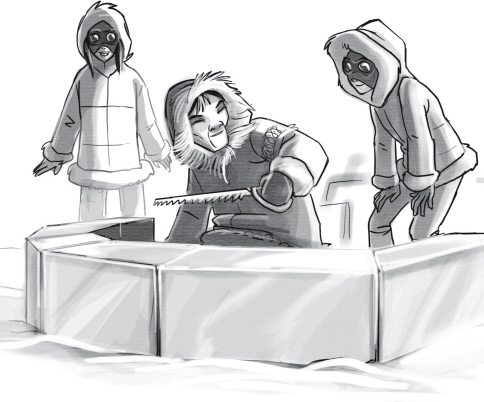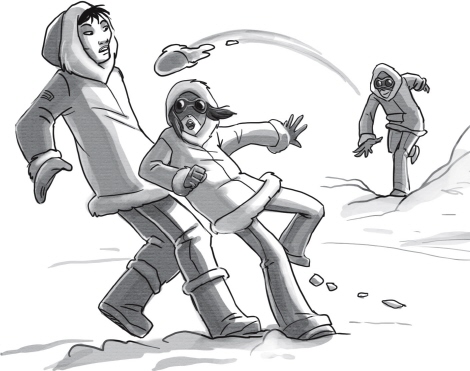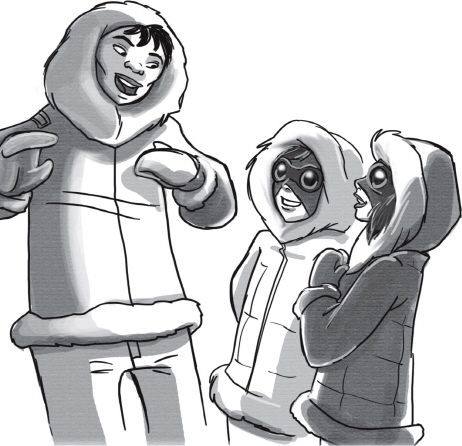
“We’re not giving up,” said Ben. “See that sign by the door. There’s traditional igloo and boat building going on outside. Someone else might know Lukie’s story and have the information we want.”
They pulled on their coats, gloves and balaclavas, then pushed open the swing door and stepped into the bitter air. A freezing wind blew round them making the flags flap violently. They could hear the ice cracking against the shore as the grey waves washed it in.
“Look at this,” gasped Zoe, staring at a display board that showed maps of the Arctic and the changes that had occurred over the years. “Thirty years ago there was about three times as much old ice as there is now.”
“What’s old ice?” asked Ben.
“Old ice is the permanent Arctic ice cap,” said Zoe. “And according to this it’s getting smaller very quickly.” She read aloud: “‘Each year it’s replaced with newer, thinner ice that melts more easily in the summer.’”
“That’s not good news for the polar bears,” said Ben. “There’ll be even fewer seals to eat.”
They walked on through an arch made of whale rib bones. Ben strode ahead along a cleared path to a circle of snow bricks. An old man in traditional dress was squatting by it, cutting more bricks with a long knife. His thick black hair, threaded with white, stuck out from under his hood. He looked up and nodded as the children approached.
“Cool!” exclaimed Ben. “I didn’t realise people made igloos any more.”
The old man shook his head. “Not many of us learn how to do it these days,” he said.

The children could hear the American in his voice, but they could tell from his accent that English was not his first language. “Eskimos like me used to build igloos when they travelled many miles over the ice to hunt.”
“Eskimos?” exclaimed Zoe. “But I thought we weren’t supposed to call you that.”
The old man’s lined face broke into a grin. “You’ve heard it’s an insult to our people. It is not used in Canada, but here in Alaska we are proud to call ourselves Inupiat Eskimos. Though of course you can call me by my name, Amaguq.”
“How long does it take to build an igloo?” asked Ben eagerly. “I’ve always wanted to have a go.”
“We haven’t got time to chat,” Zoe muttered to Ben. But Amaguq was obviously pleased to talk to visitors about his craft.
“For a skilled worker like me, a few hours,” said the man. While he talked he cut a new block and trimmed it with an expert hand so that it fitted neatly on the igloo wall. It was just like watching a bricklayer at home, thought Ben.
“An igloo made a perfect shelter for hunters who were away for weeks on the ice,” said the man. He put his knife down. “Of course, if they needed shelter in a hurry they’d dig a snow hole in a bank. Much quicker.”
“Are they easier to build?” asked Ben.
Amaguq grinned. “Much easier. You just dig. With the entrance away from the wind if possible – and you mustn’t forget to make an air hole.”
This was all very interesting, thought Zoe, but it wasn’t getting them any closer to finding out where the bear had been killed. The whole purpose of coming out here was to find someone who knew Lukie’s story.
“That’s fantastic,” she said, as the old man finished speaking. “Maybe we can put it in our project. We’re studying this area,” she explained. “And you might be able to help us with something. We’d like to write about Lukie, the fisherman who works here – the one who was attacked by the polar bear.”
“Do you know where it happened, Amaguq?” Ben joined in.
“You’d have to ask Lukie that,” said the old Eskimo.
“We’d love to talk to him,” said Zoe. “But he’s not around at the moment.”
“He’s sure to be in soon,” the man replied. “He promised to repair one of the old canoes in the whaling display.”
“So he’s not out fishing?” asked Ben.
“Not today, there’s a snowstorm forecast for later.” Amaguq picked up his knife and began to cut another snow brick.
The children thanked him and retraced their steps towards the Heritage Centre.
“Glad the weather’s stopped Lukie going fishing,” said Ben. “Otherwise we might have had to wait ages to speak to him.”
“True,” said Zoe, frowning. “But there’s one thing you’ve forgotten. We’re the ones who might be out when the snowstorm hits.”
“We’ll be all right,” Ben said cheerfully. “We’ve got our tent.”
They got to the door of the centre.
“Fingers crossed Lukie’s arrived,” said Ben. “And that he can remember where the attack happened.”
“I hope he doesn’t think it’s strange we want to know,” Zoe answered. “We have to be careful what we ask, remember.”
Ben grinned. “Actually I was planning to say, ‘Hi, we work for Wild, which is a top-secret organisation that we mustn’t tell you about, and we’re off on an undercover mission to –’”
Zoe pushed him into a pile of soft snow that had been cleared from the path. Then she scooted off, giggling, to avoid a volley of snowballs from her brother.
She almost collided with a young man in a bright red snow jacket who was making his way down the path. One of Ben’s snowballs hit him on the chest.

Ben ran up, looking sheepish.
“I’m so sorry!” he panted, as the young man brushed off the snow. “I was aiming at my sister.”
“No problem!” The man grinned. He had a round, cheerful face, with brown skin and a shock of black hair under his hood. “I heard there were two kids out here who wanted to know about my encounter with the bear. I guess I’ve found you – or rather, you’ve found me! Lukie’s the name.”
“I’m Zoe and this is Ben,” said Zoe eagerly. “We read about you on Mr Airut’s blog before we came away on holiday.
We’d be very interested to hear about your encounter with the polar bear.”
“If I had a dollar for every time I’ve been asked to tell this story, I’d be a rich man,” said Lukie, eyes twinkling. “I could give you a tale of great bravery. I could speak of how I tracked down the mighty snow beast and slew it with my bare hands. But in truth I was out ice fishing and suddenly there she was, the length of two kayaks away.”
“What happened?” asked Ben, wide-eyed.
“I had to think very quickly, Ben,” said Lukie. “I knew I had to let her get my scent so that she could identify me as human. Polar bears usually back off then.”
“But she didn’t…” prompted Zoe.
“She stared hard at me with her deep, dark eyes,” Lukie went on. “And all the time she was baring her teeth and hissing.”
“I’ve read about that sort of behaviour,” said Ben. “That sounds like one angry bear.”
“I’ll never forget it, that’s for sure,” said Lukie. “I stood tall and waved my arms to scare her, but it didn’t work. She began to move towards me and the next thing she was lowering her head and…CHARGING!”
He roared, making Ben and Zoe jump. They grinned at each other, a little embarrassed.
“I knew I’d never outrun her,” Lukie went on. “There was only one thing I could do. I fumbled for my gun and for a second I thought I was too late. But somehow I managed to get a shot off just as she reared up for the final attack.”

“The blog we read said she was a lactating mother,” said Zoe. “Wasn’t that unusual? I mean, for a mother to leave her cubs?”
Lukie thought for a moment. “I guess so,” he replied. “I remember Theo said she was very thin. She must have been desperate for food.”
“So she saw you as a meal,” said Ben.
Lukie nodded. “I was sorry to kill her, but it was either her or me.”
“Did you see any cubs?” Zoe asked anxiously.
“I can see you’re an animal lover, Zoe,” said the fisherman. “There was no sign of any cubs. I didn’t know then that she was a mother, and I didn’t stick around in case there were any more ravenous bears about. I got the carcass back by towing it behind my kayak. I couldn’t just leave it there. The Inupiat are allowed to kill polar bears, but according to our law the carcass must be registered with the Fish and Wildlife Service. And we are not allowed to waste a kill. Anyway, Theo heard about it and wanted to have a look first. It was only when he made his examination that I found out she must have had cubs somewhere.” He sighed. “We don’t hunt mother bears. We want to keep bear numbers up.”
“Is there a map where you could show us the place it happened?” asked Ben. “You should put a flag or something on there to mark your brave encounter.”
“Follow me,” said Lukie, with a smile. He led them over to one of the maps they had seen outside the entrance to the centre. “This is our latest update of the extent of the ice cover in this area,” he explained. “And I was here.”
To Ben and Zoe’s surprise, Lukie did not point to anywhere on the land. Instead his finger went straight to the north side of a large island of ice, separated from Fairwood by a wide channel of water. “I must have been about here on this floe,” he said. “That spur that sticks out to the north. I always find a good supply of cod there.”
“But that’s just floating ice!” exclaimed Ben, shocked. “I thought bears built birthing dens on the mainland. What was she doing out there?”
“A few bears make their dens in the snow banks on the ice floes,” said Lukie.
The saleswoman waved at him from the door. “Lukie!” she called. “There’s a delivery of guidebooks. I need your muscles!”
Lukie gave them a rueful grin and went off to help.
Ben peered closely at the map. He was memorising the coordinates of the area. Once they were entered into their BUGs, it would make the search much easier.
“This changes everything,” he said. “We’ve got to reach that ice floe and there’s a bit of Arctic Ocean in the way.”
Zoe gazed solemnly out at the bleak stretch of icy water. “This mission’s going to be much more dangerous than we thought.”